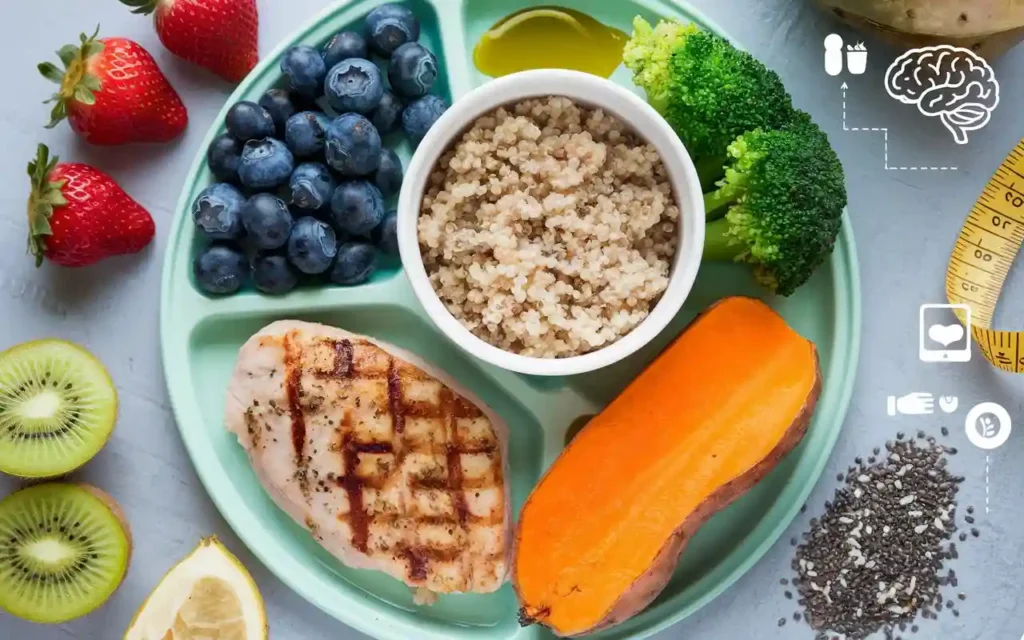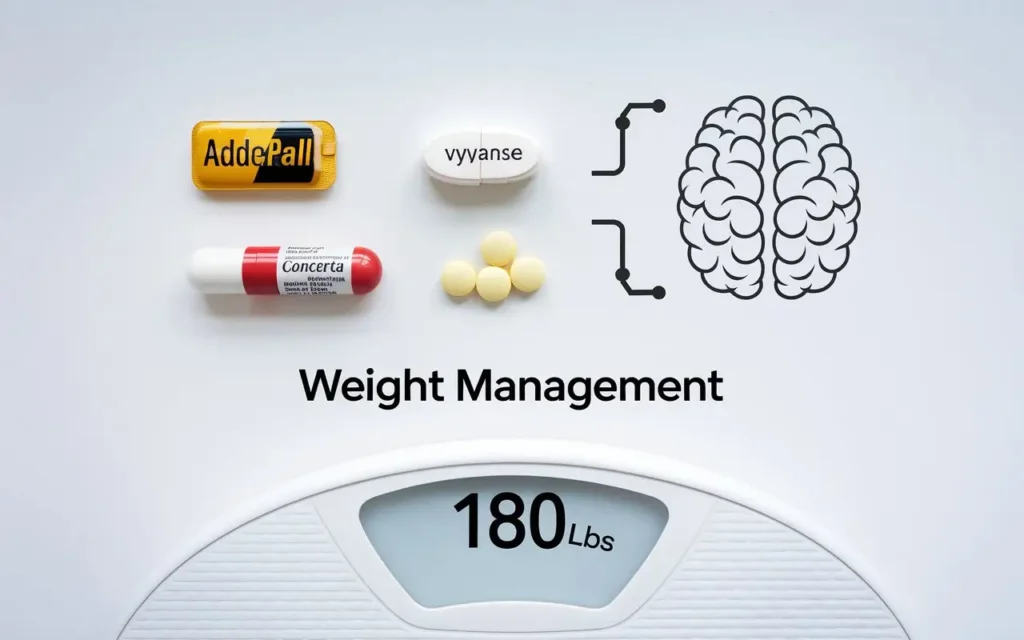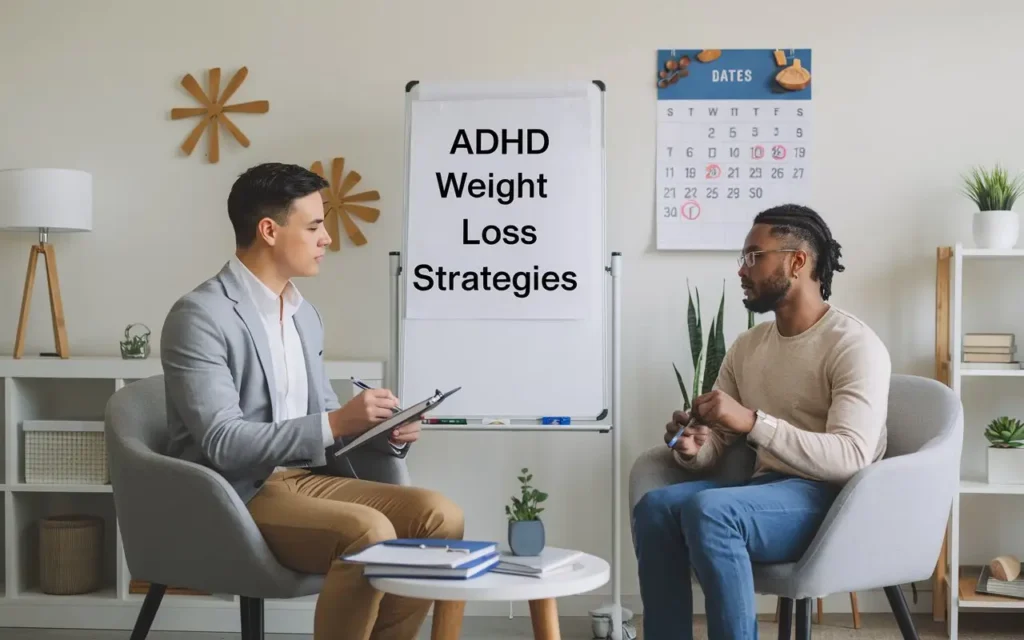ADHD Weight Loss: Comprehensive Guide to Managing Weight with ADHD
Table of Contents
- Introduction to ADHD and Weight Loss
- Understanding ADHD: Symptoms and Challenges
- The Connection Between ADHD and Weight Gain
- Diet Strategies for ADHD Weight Loss
- Exercise Routines for ADHD Weight Loss
- Mindfulness Techniques for ADHD Weight Loss
- ADHD Medications and Their Impact on Weight Loss
- Nutritional Supplements for ADHD Weight Loss
- Behavioral Therapy Techniques for ADHD Weight Loss
- The Role of Sleep in ADHD Weight Management
- Success Stories: ADHD Weight Loss Journeys
- Conclusion and Final Tips
1. Introduction to ADHD and Weight Loss
ADHD weight loss is essential because managing weight can significantly improve the overall quality of life for individuals with ADHD. ADHD, or Attention-Deficit/Hyperactivity Disorder, often comes with challenges such as impulsivity, hyperactivity, and difficulty maintaining focus, which can complicate weight loss efforts. Understanding the unique interplay between ADHD and weight management is crucial for developing effective strategies.
2. Understanding ADHD: Symptoms and Challenges
ADHD weight loss strategies must account for the core symptoms of ADHD, which include inattention, hyperactivity, and impulsivity. These symptoms can lead to inconsistent eating habits, difficulty following structured diet plans, and challenges in maintaining regular exercise routines.
2.1 What is ADHD?
ADHD is a neurodevelopmental disorder characterized by persistent patterns of inattention and/or hyperactivity-impulsivity that interfere with functioning or development. It affects both children and adults, with symptoms varying in intensity and presentation.
2.2 Common Symptoms
- Inattention: Difficulty sustaining attention, following detailed instructions, and organizing tasks.
- Hyperactivity: Excessive fidgeting, inability to stay seated, and constant motion.
- Impulsivity: Hasty actions without forethought, interrupting others, and difficulty waiting turns.
2.3 Challenges in Weight Management
The symptoms of ADHD can create several obstacles in achieving and maintaining a healthy weight:
- Impulsive Eating: Difficulty resisting immediate gratification can lead to unhealthy snacking.
- Inconsistent Routines: Irregular schedules make it challenging to maintain consistent meal and exercise times.
- Emotional Eating: Difficulty managing emotions can result in overeating as a coping mechanism.
3. The Connection Between ADHD and Weight Gain
ADHD weight loss is often complicated by a direct and indirect relationship between ADHD symptoms and weight gain. Understanding this connection is key to addressing weight management effectively.
3.1 Biological Factors
Research suggests that individuals with ADHD may have differences in brain chemistry that influence appetite regulation and metabolism. Certain neurotransmitters, such as dopamine, play a role in both ADHD and weight management.
3.2 Medication Side Effects
ADHD medications, particularly stimulants, can suppress appetite, leading to weight loss in some cases. However, non-stimulant medications may have varying effects on weight, sometimes contributing to weight gain.
3.3 Lifestyle Factors
People with ADHD might engage in sedentary behaviors due to difficulty maintaining structured exercise routines. Additionally, impulsivity can lead to unhealthy eating choices and irregular meal patterns.
4. Diet Strategies for ADHD Weight Loss

ADHD weight loss can be effectively supported through tailored dietary strategies that consider the unique needs of individuals with ADHD.
4.1 Balanced Nutrition
Focusing on a balanced diet rich in whole foods helps stabilize energy levels and improve focus. Incorporate a variety of fruits, vegetables, lean proteins, and whole grains.
4.2 Structured Meal Planning
Creating a consistent meal schedule can help manage impulsive eating. Planning meals ahead of time reduces the likelihood of making unhealthy food choices on the go.
4.3 Protein-Rich Foods
Including protein in every meal can help maintain satiety and reduce cravings. Foods like eggs, lean meats, legumes, and nuts are excellent choices.
4.4 Limiting Sugar and Processed Foods
Reducing the intake of sugary and highly processed foods can prevent energy crashes and support overall health.
4.5 Mindful Eating Practices
Encouraging mindful eating can help individuals with ADHD become more aware of their hunger and fullness cues, reducing overeating.
5. Exercise Routines for ADHD Weight Loss

ADHD weight loss is significantly enhanced by incorporating regular physical activity tailored to the individual’s preferences and lifestyle.
5.1 Benefits of Exercise
Exercise not only aids in weight loss but also helps improve focus, reduce hyperactivity, and enhance overall mood, which are beneficial for managing ADHD symptoms.
5.2 Choosing the Right Type of Exercise
Individuals with ADHD may benefit from engaging in activities that are dynamic and enjoyable, such as:
- Cardio: Running, cycling, or swimming can provide an outlet for excess energy.
- Strength Training: Building muscle mass helps boost metabolism.
- Mind-Body Exercises: Yoga and Pilates can improve concentration and reduce stress.
5.3 Creating a Consistent Routine
Establishing a regular exercise schedule can help individuals with ADHD maintain consistency. Setting specific times for workouts can integrate physical activity seamlessly into daily life.
5.4 Incorporating Variety
Variety in exercise routines can prevent boredom and maintain motivation. Mixing different types of workouts keeps the process engaging and effective.
5.5 Setting Realistic Goals
Setting achievable fitness goals provides a sense of accomplishment and encourages ongoing participation in physical activities.
6. Mindfulness Techniques for ADHD Weight Loss

ADHD weight loss can be significantly supported by incorporating mindfulness techniques, which help improve focus and emotional regulation.
6.1 What is Mindfulness?
Mindfulness involves paying deliberate attention to the present moment without judgment. It helps individuals become more aware of their thoughts, feelings, and behaviors.
6.2 Benefits of Mindfulness for ADHD
- Improved Focus: Enhances concentration and reduces distractibility.
- Emotional Regulation: Helps manage impulsive reactions and emotional eating.
- Stress Reduction: Lowers stress levels, which can otherwise contribute to weight gain.
6.3 Mindful Eating Practices
Mindful eating encourages individuals to savor their food, recognize hunger and fullness cues, and reduce overeating. Techniques include eating slowly, eliminating distractions during meals, and paying attention to the taste and texture of food.
6.4 Meditation and Breathing Exercises
Incorporating meditation and deep breathing exercises can enhance mindfulness. Even a few minutes a day can make a significant difference in managing ADHD symptoms and supporting weight loss efforts.
6.5 Incorporating Mindfulness into Daily Life
Integrating mindfulness into daily routines, such as during walks, workouts, or while performing household tasks, can help maintain consistent practice and reinforce positive habits.
7. ADHD Medications and Their Impact on Weight Loss

ADHD weight loss can be influenced by the medications used to manage ADHD symptoms. Understanding these effects is crucial for effective weight management.
7.1 Stimulant Medications
Stimulant medications like Adderall and Ritalin are commonly prescribed for ADHD and can suppress appetite, potentially leading to weight loss. However, this effect may diminish over time as the body adjusts to the medication.
7.2 Non-Stimulant Medications
Non-stimulant medications, such as Strattera, have a different mechanism of action and may not significantly impact appetite. Some individuals may experience weight gain as a side effect.
7.3 Managing Medication Side Effects
It’s essential to monitor weight changes when starting or adjusting ADHD medications. Consulting with a healthcare provider can help manage side effects through dosage adjustments or supplementary treatments.
7.4 Balancing Medication and Weight Management
Integrating dietary strategies and regular exercise can help counteract any unintended weight changes caused by ADHD medications. A holistic approach ensures both ADHD symptoms and weight are effectively managed.
7.5 Consulting Healthcare Professionals
Always consult with healthcare professionals before making any changes to medication regimens. They can provide personalized advice based on individual health needs and weight management goals.
8. Nutritional Supplements for ADHD Weight Loss
ADHD weight loss can be further supported by incorporating specific nutritional supplements that aid in managing ADHD symptoms and promoting a healthy metabolism.
8.1 Omega-3 Fatty Acids
Omega-3 supplements have been shown to improve cognitive function and reduce ADHD symptoms. They also support overall brain health and can aid in weight management by enhancing metabolism.
8.2 Vitamin D
Vitamin D deficiency is common in individuals with ADHD. Supplementing with Vitamin D can improve mood, cognitive function, and support weight loss by regulating calcium levels and metabolism.
8.3 Magnesium
Magnesium plays a role in neurotransmitter function and can help reduce hyperactivity and impulsivity in ADHD. It also supports muscle function and energy production, beneficial for weight loss.
8.4 Probiotics
Probiotics support gut health, which is linked to both mental health and weight management. A healthy gut microbiome can improve digestion and nutrient absorption, aiding in weight loss efforts.
8.5 Multivitamins
Taking a comprehensive multivitamin ensures that individuals with ADHD receive essential nutrients that might be lacking in their diet, supporting overall health and weight management.
8.6 Consulting with Healthcare Providers
Before starting any supplement regimen, it’s crucial to consult with a healthcare provider to ensure safety and appropriateness based on individual health needs and existing medications.
9. Behavioral Therapy Techniques for ADHD Weight Loss

ADHD weight loss can be effectively supported through various behavioral therapy techniques that address the psychological aspects of weight management.
9.1 Cognitive Behavioral Therapy (CBT)
CBT helps individuals identify and change negative thought patterns and behaviors related to eating and exercise. It provides strategies to overcome obstacles and develop healthier habits.
9.2 Goal Setting
Setting specific, measurable, achievable, relevant, and time-bound (SMART) goals can provide direction and motivation for weight loss efforts. Breaking down larger goals into smaller steps makes them more manageable.
9.3 Self-Monitoring
Keeping a journal or using apps to track food intake, exercise, and mood can help individuals with ADHD stay accountable and recognize patterns that impact their weight loss journey.
9.4 Positive Reinforcement
Rewarding oneself for achieving milestones can boost motivation and reinforce positive behaviors. Rewards can be non-food-related, such as treating oneself to a new outfit or a relaxing activity.
9.5 Stress Management
Learning effective stress management techniques can prevent emotional eating and help maintain focus on weight loss goals. Techniques include deep breathing, meditation, and engaging in hobbies.
9.6 Building Support Systems
Having a support network, whether through friends, family, or support groups, provides encouragement and accountability, which are vital for sustained weight loss.
10. The Role of Sleep in ADHD Weight Management
ADHD weight loss is closely linked to sleep management, as adequate sleep is essential for overall health and effective weight management.
10.1 Importance of Sleep
Quality sleep supports cognitive function, emotional regulation, and metabolic processes. Lack of sleep can lead to increased appetite and weight gain.
10.2 Sleep Challenges in ADHD
Individuals with ADHD often experience sleep disturbances, including difficulty falling asleep, staying asleep, and waking up. These challenges can hinder weight loss efforts by affecting energy levels and decision-making.
10.3 Improving Sleep Hygiene
- Consistent Sleep Schedule: Going to bed and waking up at the same time each day regulates the body’s internal clock.
- Creating a Relaxing Bedtime Routine: Engaging in calming activities before bed, such as reading or taking a warm bath, can enhance sleep quality.
- Optimizing Sleep Environment: Ensuring a comfortable, dark, and quiet sleep environment promotes uninterrupted sleep.
10.4 Impact of Sleep on Metabolism
Adequate sleep regulates hormones that control hunger and satiety, such as ghrelin and leptin. Proper sleep helps maintain a healthy metabolism, which is crucial for weight loss.
10.5 Managing Sleep Disorders
Addressing sleep disorders with the help of healthcare professionals can improve sleep quality and support weight loss goals. Treatments may include cognitive behavioral therapy for insomnia (CBT-I), medication adjustments, or other interventions.
10.6 Integrating Sleep and Weight Loss Strategies
Combining sleep management with dietary and exercise strategies creates a holistic approach to ADHD weight loss. Prioritizing sleep enhances overall well-being and supports sustained weight management efforts.
11. Success Stories: ADHD Weight Loss Journeys
ADHD weight loss is achievable, as demonstrated by numerous success stories. These narratives provide inspiration and practical insights for individuals on their weight loss journey.
11.1 Sarah’s Journey
Sarah, a 28-year-old graphic designer with ADHD, struggled with impulsive eating and maintaining a consistent exercise routine. By implementing structured meal planning and engaging in regular yoga sessions, she lost 30 pounds over a year. Sarah emphasizes the importance of setting realistic goals and seeking support from friends and family.
11.2 Michael’s Transformation
Michael, a 35-year-old teacher, faced challenges with inattention and emotional eating. Through cognitive behavioral therapy and mindful eating practices, he successfully reduced his weight by 25 pounds. Michael credits his success to the combination of professional guidance and personal determination.
11.3 Jessica’s Success
Jessica, a 22-year-old college student, battled weight gain exacerbated by ADHD symptoms. By adopting a balanced diet, incorporating strength training exercises, and prioritizing sleep, she lost 40 pounds. Jessica highlights the role of a supportive community and consistent routines in her journey.
11.4 Lessons Learned from Success Stories
- Consistency is Key: Maintaining regular habits is crucial for long-term weight loss.
- Seek Professional Help: Working with healthcare providers, therapists, and nutritionists can provide personalized strategies and support.
- Embrace Mindfulness: Being mindful of eating habits and emotional triggers can prevent overeating.
- Build a Support Network: Surrounding oneself with supportive individuals enhances motivation and accountability.
12. Conclusion and Final Tips
ADHD weight loss is a multifaceted journey that requires a comprehensive approach addressing dietary habits, physical activity, mental health, and lifestyle factors. By understanding the unique challenges posed by ADHD and implementing tailored strategies, individuals can achieve and maintain a healthy weight.
12.1 Recap of Key Strategies
- Adopt a balanced and structured diet.
- Incorporate regular and enjoyable exercise routines.
- Practice mindfulness and emotional regulation techniques.
- Monitor and manage medication effects on weight.
- Utilize nutritional supplements as needed.
- Engage in behavioral therapy to foster healthy habits.
- Prioritize sleep for overall health and weight management.
12.2 Final Tips for Success
- Stay Patient and Persistent: Weight loss is a gradual process that requires time and consistent effort.
- Celebrate Small Wins: Acknowledge and reward yourself for achieving milestones along the way.
- Adapt and Adjust: Be flexible and willing to modify strategies as needed to suit your evolving needs.
- Maintain a Positive Mindset: Focus on progress rather than perfection, and stay motivated by your goals.
Embarking on an ADHD weight loss journey is challenging, but with the right strategies and support, it is entirely achievable. Embrace the process, seek professional guidance, and stay committed to your health and well-being.
References
- Centers for Disease Control and Prevention: ADHD
- National Institute of Mental Health: ADHD
- WebMD: ADHD and Weight Management
- Healthline: ADHD and Weight Loss




